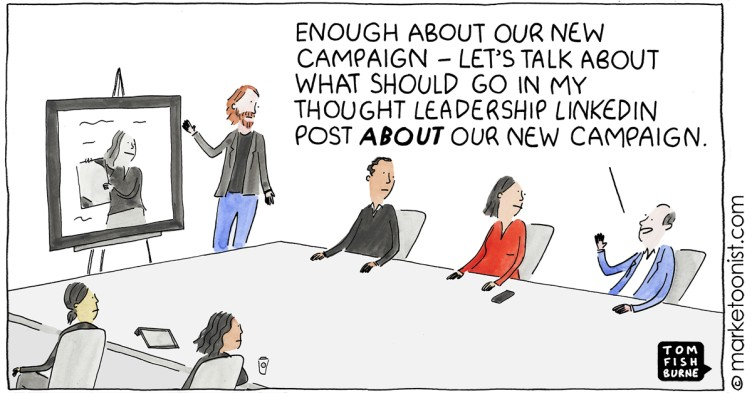Becoming the Go-To Expert: The Essentials of Thought Leadership in Content Marketing

Ready to stop being the best-kept secret in your industry? Amidst the ever-changing landscape of content marketing—where mediocre content often drowns out quality—it’s crucial to step up your game.
Get this: A recent study shows that 64% of the most successful B2B marketers have a well-documented content marketing strategy. But here’s the kicker: less than half have a dedicated team for various content types, including thought leadership. What does that mean?
It’s high time to talk about thought leadership in content marketing. This isn’t just about sounding smart; it’s about becoming the trusted source people turn to.
In this blog, you’ll learn what is thought leadership, why it’s a must-have in your content strategy, and how to do it right. If you’re tired of seeing your content go unnoticed, this is for you—time to lead, not follow.
The Real Essence of Thought Leadership
So, what’s the deal with thought leadership in content marketing? It means you’re not just another voice in the crowd. You’re the person people turn to for insights and answers in your industry. It’s a big deal, too; 65% of businesses already put thought leadership at the heart of their content marketing strategy.
In this role, you answer the questions people didn’t even know they had, and you’re the first name that comes up when someone’s got an industry-specific problem to solve.
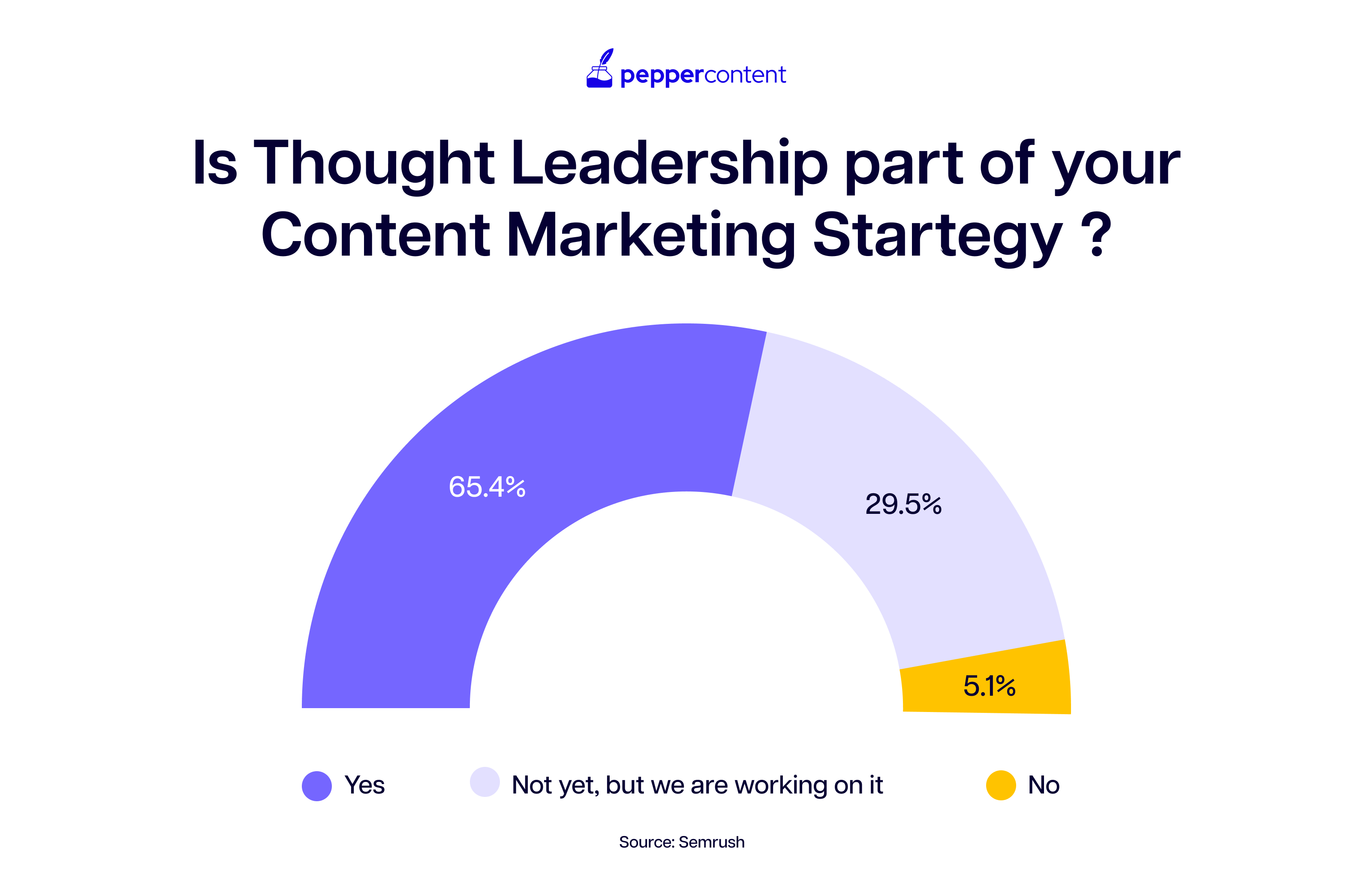
The Five Crucial Components of Thought Leadership
So, do you want to excel in thought leadership in content marketing truly? It’s not just about churning out articles. Consider these key elements:
- Expertise: You’ve got to know your stuff, inside and out. This is the foundation of content that speaks authority.
- Visionary thinking: Don’t just follow trends; set them. That’s how you go from contributor to influencer.
- Influence: You have to be the person people listen to. Influence isn’t just about reach; it’s about impact.
- Trust: Building credibility in your content is non-negotiable. Without trust, even the best content falls flat.
- Consistency: Keep delivering high-quality content. Consistency through a content calendar helps build your brand and solidifies your position as a thought leader.
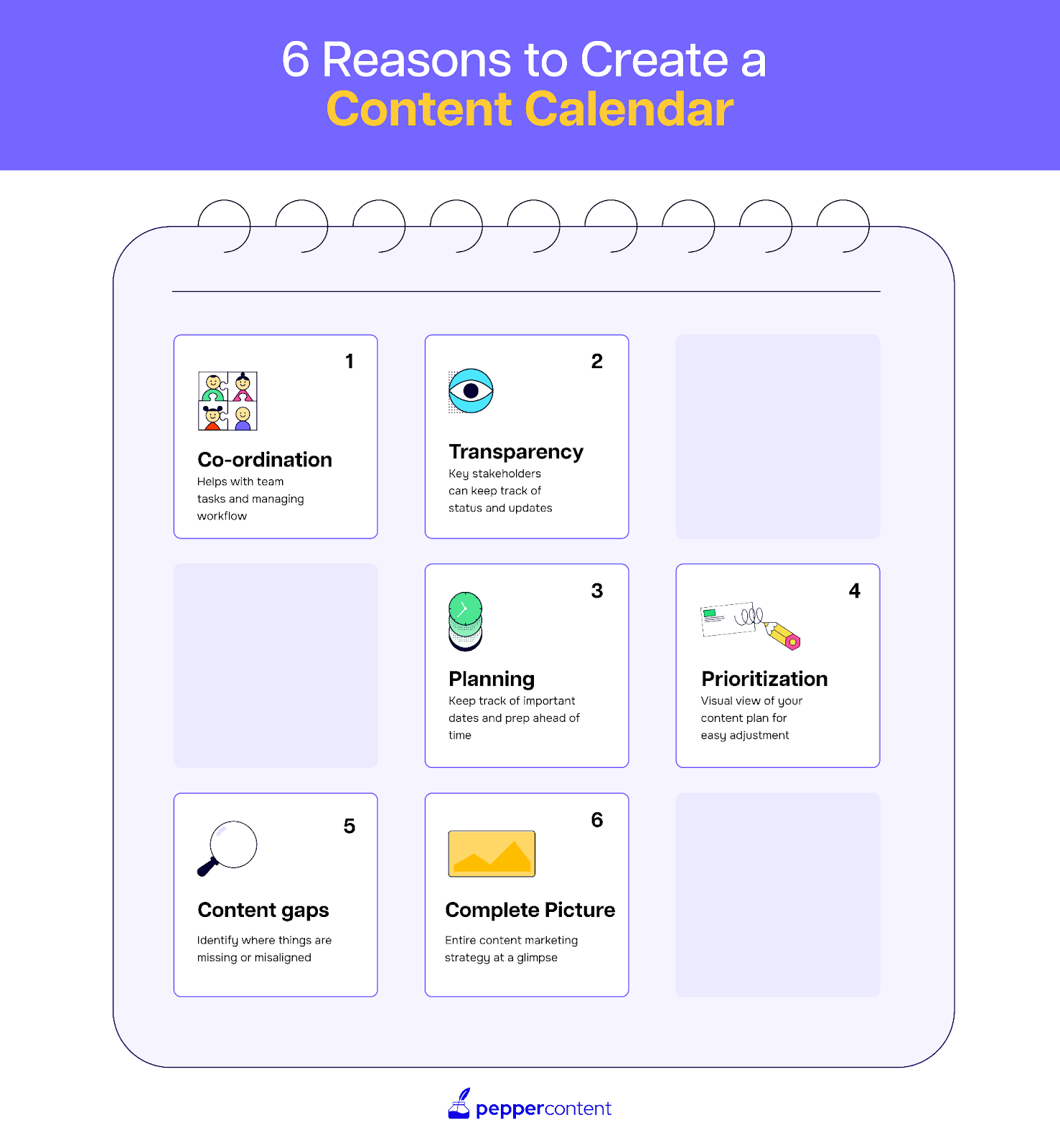
Helpful read: How to Write Thought Leadership Content: 10 Simple Tips
Cracking the Code: Thought Leadership Vs. Content Marketing
Do you want to become a thought leader and ace your content marketing game? Here’s a fact: they’re not the same, but they can be two sides of the same coin. Let’s clarify this:
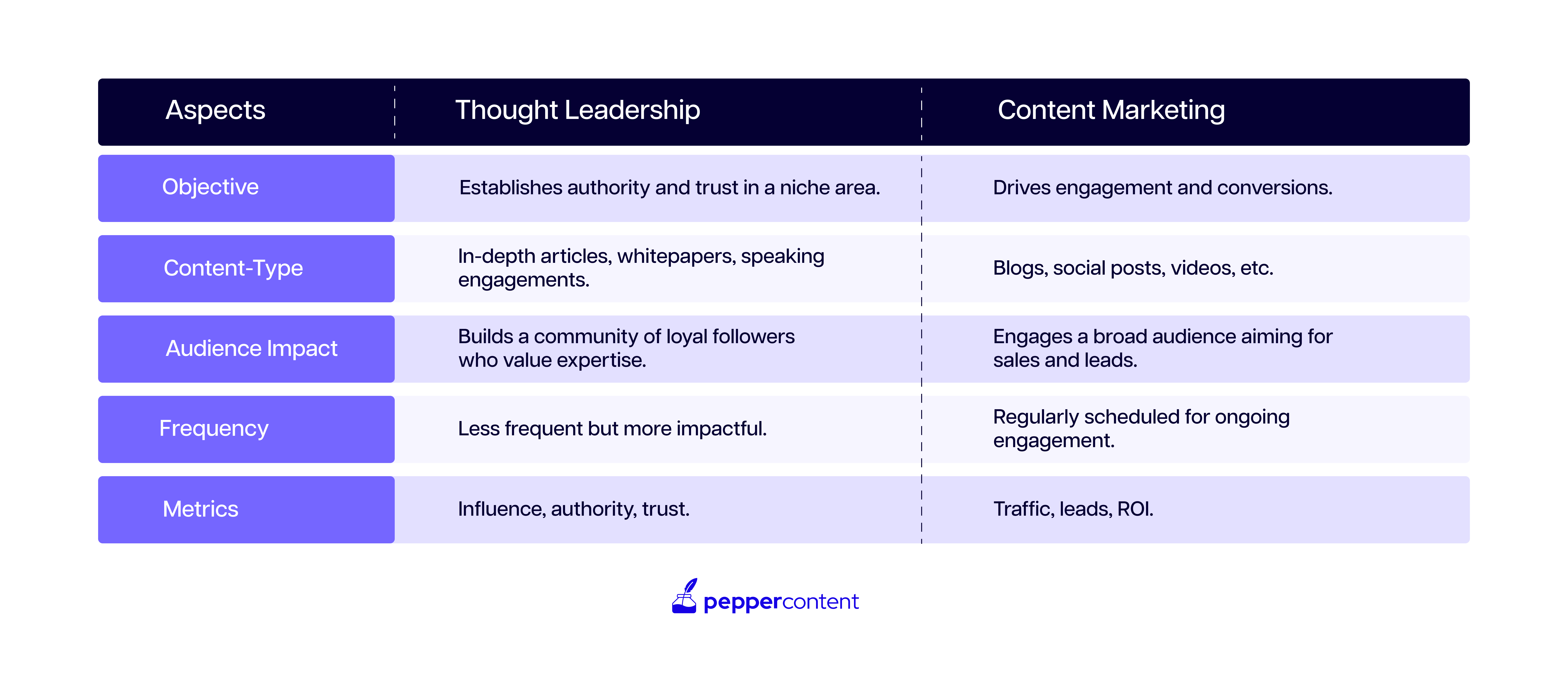
HubSpot’s Masterful Fusion of Thought Leadership and Content Marketing:
Its co-founder, Dharmesh Shah, has long been a thought leader in inbound marketing. His in-depth articles and keynote talks offer industry insights beyond HubSpot’s products. His knowledge also got a special place in various renowned platforms, including The Wire, Livemint, Inc., and more.
On the other hand, HubSpot’s content marketing strategy, including its blogs and how-to guides, focuses more on addressing immediate customer needs. The company successfully combines both by using Shah’s thought leadership content to elevate its broader content marketing efforts.
Spotlight on Thought Leaders:
Let’s take a moment to shine a light on a couple of thought leaders who are shaping their industries in meaningful ways:
- Mark Kilens (CEO and Co-founder of TACK, a media and on-demand go-to-market firm helping businesses align and accelerate their go-to-market)
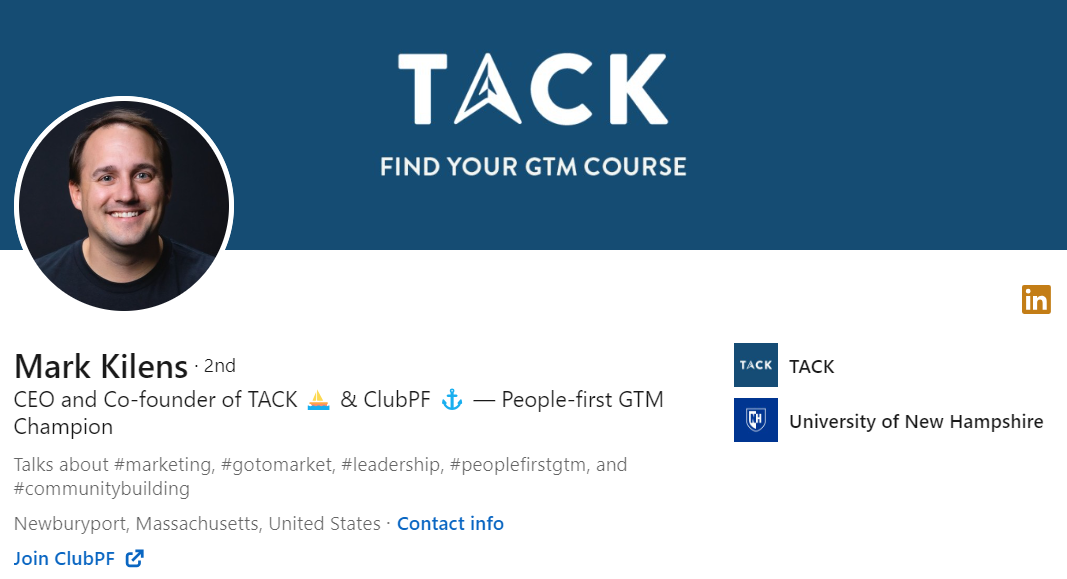
- Topics: Primarily focuses on inbound marketing and leadership.
- Tone: Authoritative yet approachable.
- Content: Known for his insightful webinars, his content often explores new challenges and solutions in the rapidly evolving inbound marketing landscape.
- Impact: His in-depth webinars and articles often set the tone for inbound marketing trends.
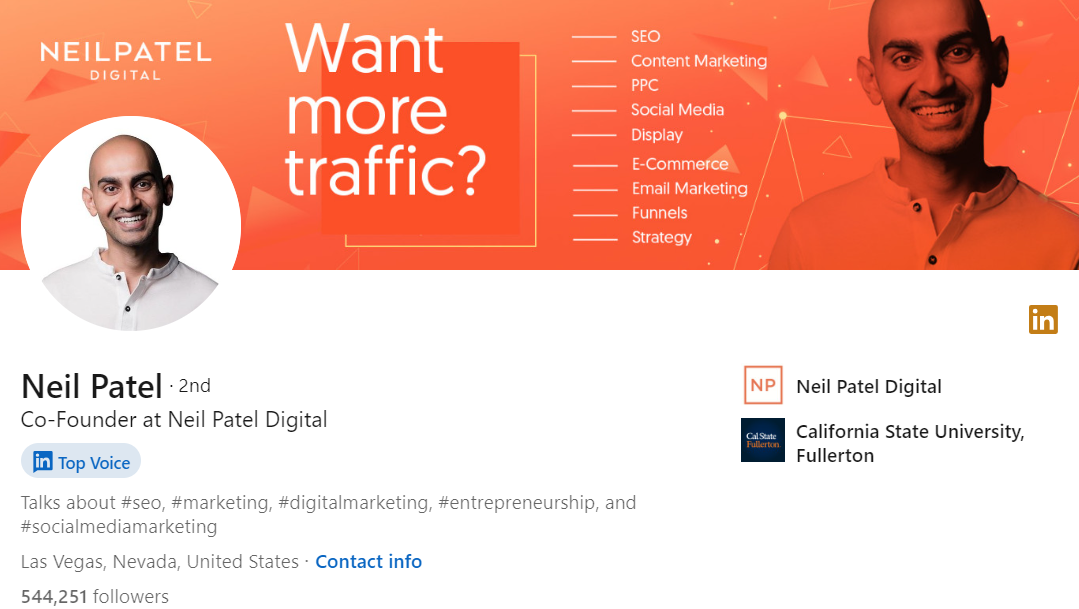
- Topics: Specializes in SEO and content marketing.
- Tone: Educational and straightforward.
- Content: His blogs are highly data-driven and often provide actionable tips, making them essential reading for both beginners and veterans in SEO.
- Impact: His detailed guides and tools like Ubersuggest have become go-to resources for anyone in SEO.
These thought leaders are more than just content creators; they are trendsetters who have a substantial impact on their respective fields. Their distinct styles, in-depth content, and the authority they wield in their topics set them apart.
Insightful read: Marcom Expert Taleena Alim Helps Brands With Winning Thought Leadership Content
Planning Your Route to Thought Leadership Through Content
Have you ever wondered how some professionals become go-to experts in their fields? The secret often lies in an effective strategy for thought leadership content marketing. Here are a few crucial things to keep a check on:
1. Target audience and niche specialization
To make a meaningful impact, you can’t be everything to everyone. Start by zeroing in on your ideal audience and honing your niche expertise. Analyze market gaps, study your competition, and understand customer pain points. Your thought leadership content strategy should be tailored to address the needs of this specific group.
Quick tip to excel at it: Conduct regular surveys or social media polls to gauge the evolving interests and concerns of your target audience. This will keep your approach fresh and relevant.
2. Keyword research and topic clustering
It’s not just about climbing the Google ladder. Effective SEO practices can actually spotlight your expertise. Use keyword research to identify what your target audience is searching for and craft content around those topics. This is more than smart SEO; it’s a key part of your thought leadership content marketing.
Quick tip to excel at it: Use tools like Google Trends or SEMrush to identify emerging topics in your industry. Being one of the first to discuss these can cement your status as a thought leader.
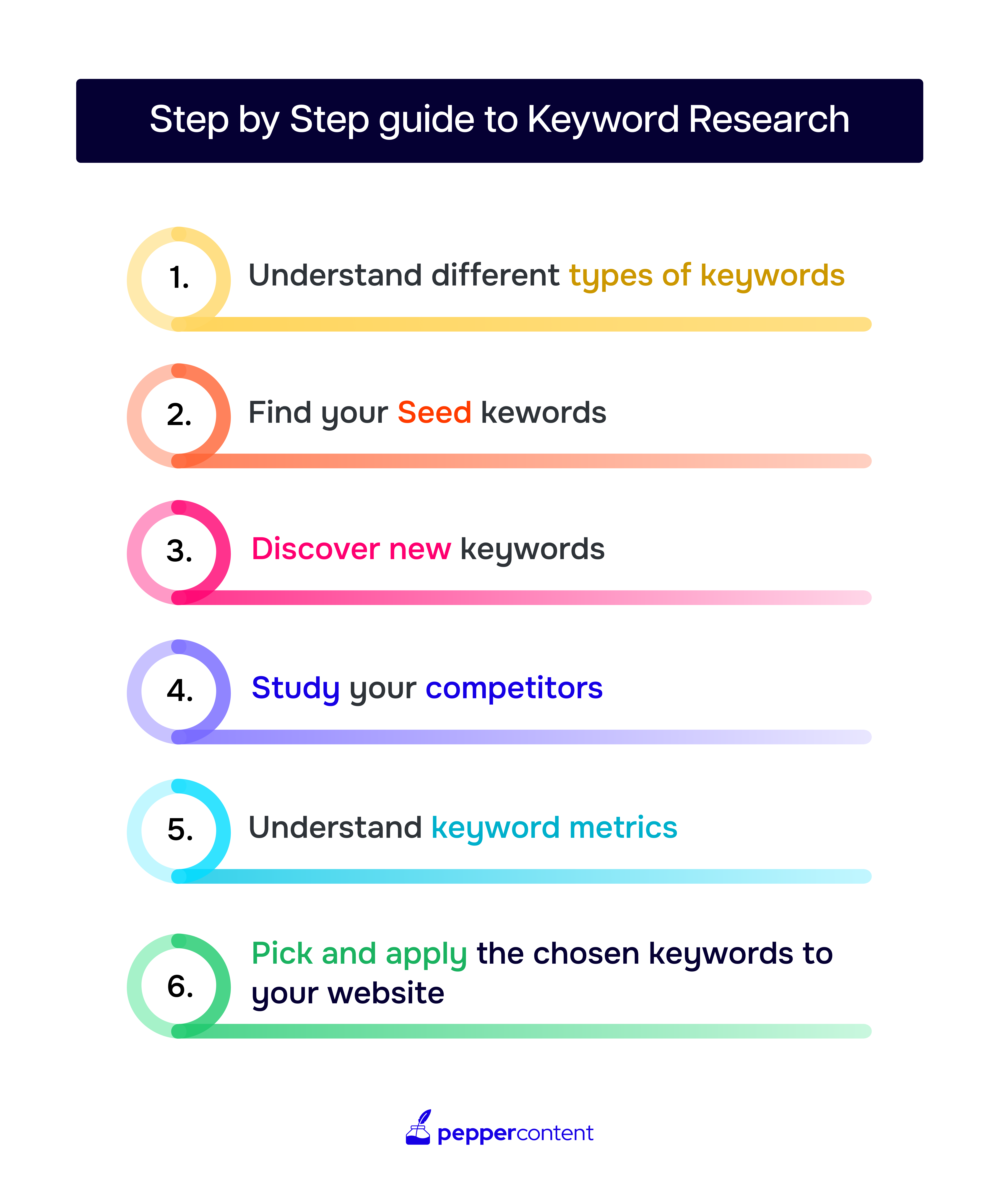
3. Content types best suited for thought leadership
The content format can make or break your efforts. While blogs are a good starting point, think bigger. Long-form articles, whitepapers, and webinars allow for a deeper dive into topics, providing real value and solidifying your thought leadership marketing credentials.
Quick tip to excel at it: Rotate your content types to keep your audience engaged. An in-depth whitepaper one month could be followed by a highly engaging webinar the next, keeping your thought leadership dynamic.
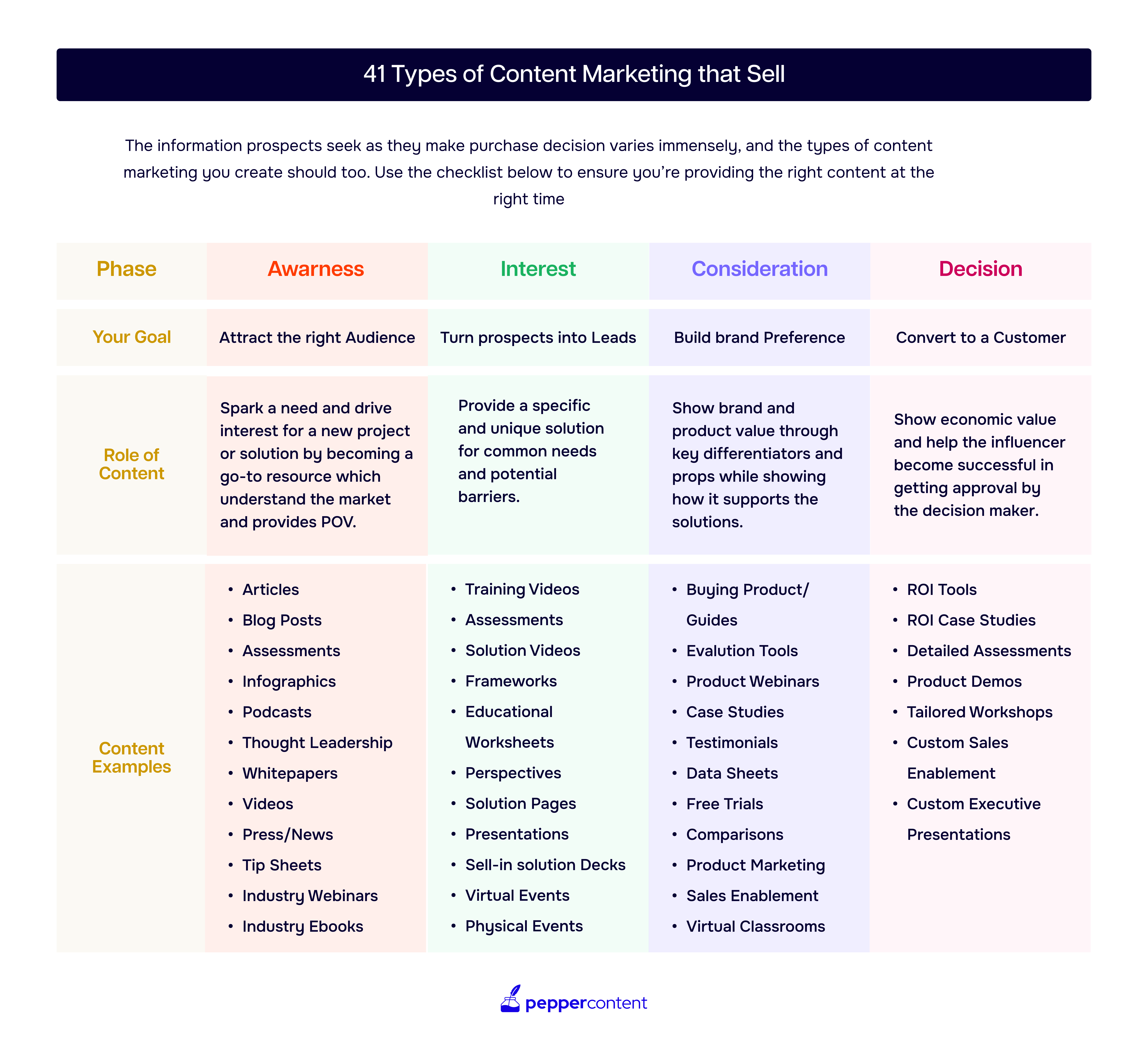
Insightful read: How to Promote Thought Leadership Content: 9 Successful Examples
Turning Ideas into Impact: 3 Practical Steps to Implement Thought Leadership
Let’s get down to brass tacks. You’re all in for making a lasting impression as a thought leader. But how do you go from intent to execution? Here are some actionable steps you can take advantage of.
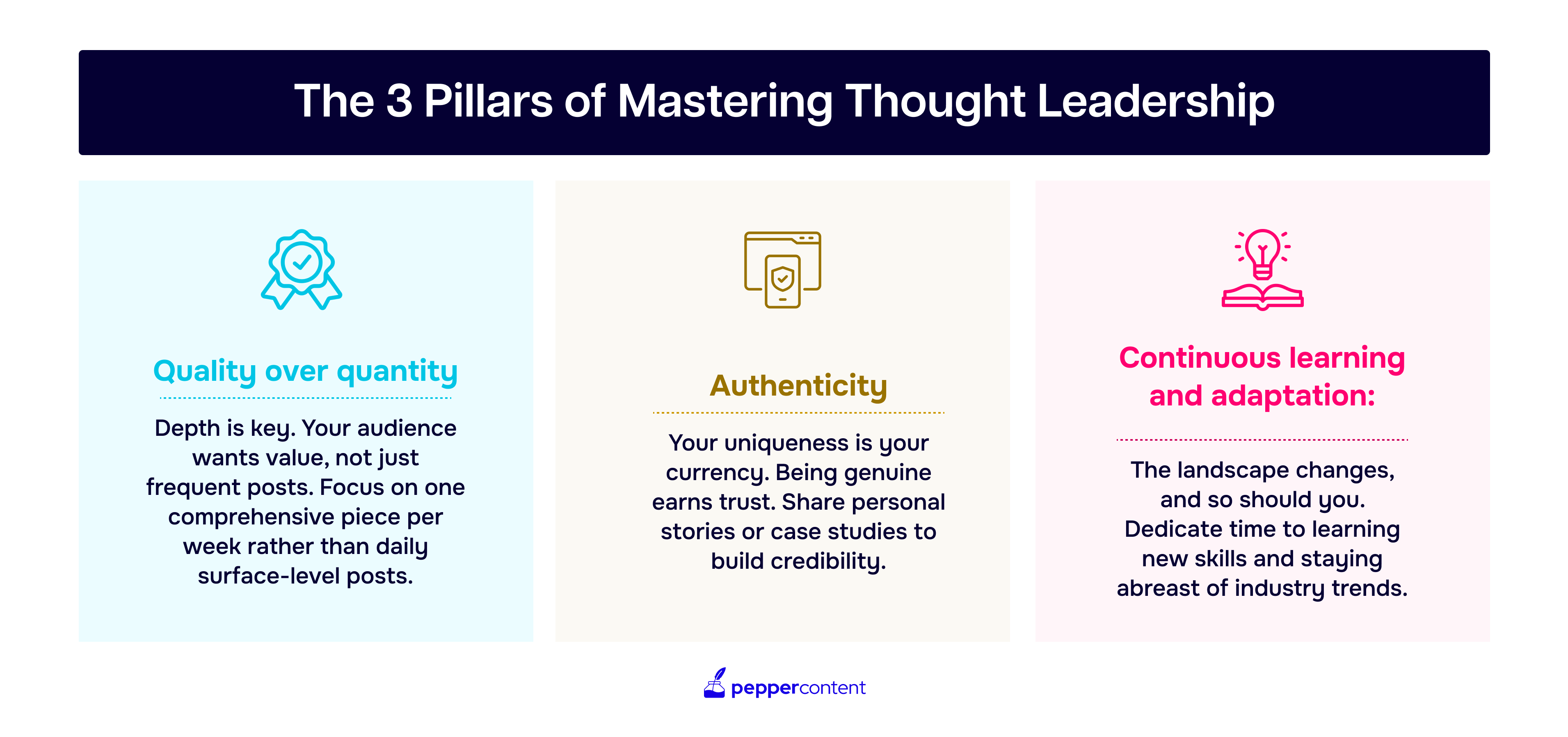
Step 1: Cultivate Credibility and Authenticity
To establish yourself as a thought leader, your content must do more than just tick the boxes of factual correctness. It must radiate with the kind of authenticity and credibility that only comes from a deep, nuanced understanding of your field. Your insights shouldn’t just be correct—they should feel real, lived-in, and borne out of a rich tapestry of experience.
Here’s how to ensure your content deeply resonates and reflects a profound grasp of the subject matter:
- Use language with precision: Employ industry jargon and references naturally. For example, if your audience is developers, use their shorthand like “JS” instead of “JavaScript”.
- Weight ideas appropriately: Present well-known concepts as common knowledge without overemphasizing them. Recognize what is truly insightful versus what is considered basic in your field.
- Share credible anecdotes: Include stories and examples that reflect real-life scenarios of your audience. This demonstrates a deep understanding of their daily challenges and experiences.
- Participate in community spaces: Immerse yourself in the platforms and forums where your audience is active. This could mean engaging in industry-specific online communities or attending professional gatherings.
- Balance polish with authenticity: Ensure your content is well-crafted but avoid over-polishing to the point where it loses the nuances that speak to your audience’s real-world experiences.
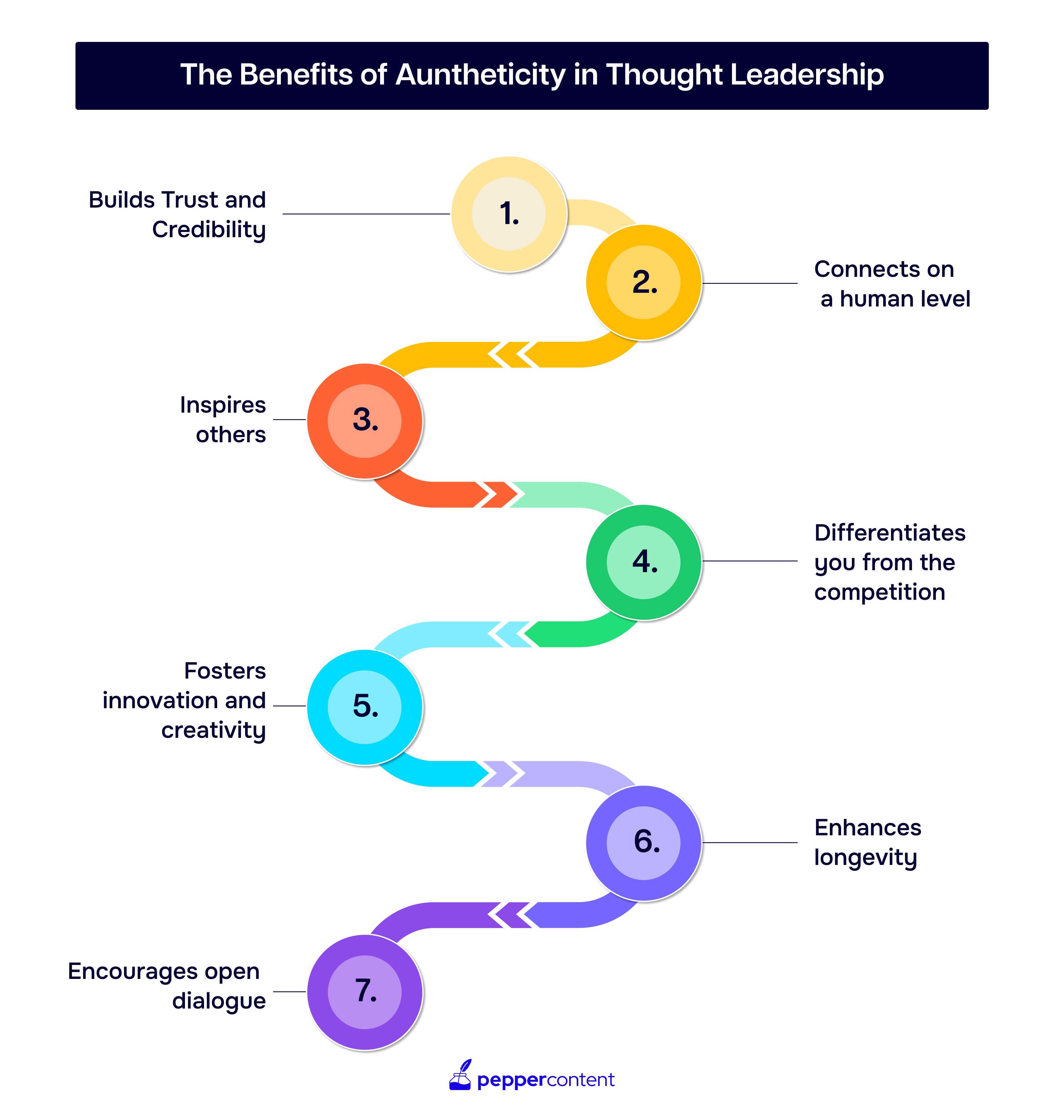
Step 2: Stay updated with content gap and refresh
Stale content is a thought leadership killer. Regularly updating your pieces can push them up in search engine rankings and breathe new life into your portfolio.
For instance, a six-month-old article on content marketing can be revitalized with recent statistics or a fresh case study. Make it a habit to go back and refresh such articles with new statistics, expert quotes, or insights based on recent trends.
Step 3: Maximize distribution channels
Once your content is up-to-date and SEO-friendly, you need to push it out through channels where your audience hangs out. If you’re targeting professionals, LinkedIn is your ally.
If you’re into lifestyle topics, Instagram and Pinterest might be more fitting. Always leverage A/B testing to determine which type of content performs better on different platforms and tweak your strategy accordingly.
Helpful read: Content Distribution Guide: Top Strategies for Marketers
Metrics That Make Your Thought Leadership Tangible
Let’s get this straight—you’ve put in the hard work, so how do you know it’s paying off? This is where metrics come into play to quantify your thought leadership’s impact.
Engagement metrics
These metrics offer a snapshot of how effectively your content engages the audience. They serve as immediate feedback mechanisms, revealing whether your content is compelling enough to elicit interaction. Here are some key engagement metrics to focus on:
- Social shares: This number reflects how often your content is shared across social media platforms. It acts as a barometer for its reach and resonance.
- Comments: These gauge the level of conversation your content triggers, indicating both reach and depth of impact.
SEO metrics
Search Engine Optimization (SEO) metrics provide a comprehensive view of your content’s performance in search engine rankings, which is crucial for visibility. Here are crucial SEO metrics to consider:
- Search engine result page (SERP) ranking: This shows where your content appears on search engine result pages, indicating its SEO effectiveness.
- Organic traffic: This tracks the number of visitors coming to your site via search engines, indicating the quality of your SEO strategies.
- Backlinks: These are links from other reputable websites pointing back to your content, endorsing your content’s credibility.

Influence metrics
These metrics assess your larger impact within your professional circle and the industry at large, going beyond mere online interaction to gauge real-world clout. Below are the influence metrics to keep an eye on:
- Speaking invitations: Frequent invitations to speak at industry events suggest that your thought leadership is recognized and sought after.
- Mentions by other thought leaders: Being cited or quoted by other industry experts is a qualitative yet powerful indicator of your rising influence.
Must read: 5 Easy-peasy Ways to Measure the Success of Your Content Marketing
Concluding thoughts
When it comes to thought leadership, simply creating content is not enough. The magic lies in the amalgamation of quality, strategy, and analytics. To ascend as a thought leader, you need a focused approach—pinpointing your niche, crafting value-driven content, and keeping tabs on engagement, SEO, and influence metrics.
Here are some key takeaways for you:
- Target your core audience through specialized content.
- Prioritize quality over quantity, but don’t ignore SEO best practices.
- Utilize varied formats like webinars and whitepapers.
- Always monitor your metrics to fine-tune your approach.
Elevate your strategy by embracing these principles, and watch your influence soar.
Want expert-led content for your brand? Try Pepper Content’s thought leadership writing services today!
Latest Blogs
Learn how to rank on AI search engines like ChatGPT, Perplexity, and Gemini by optimizing your content for authority, structure, and relevance. Stay ahead in AI-driven search with this strategic guide.
Explore the best healthcare SEO services for your medical practice. Improve online visibility and effectively reach more patients in need of your services.
Discover top social media agencies specializing in banking solutions, enhancing financial services and driving engagement.
Get your hands on the latest news!
Similar Posts

Demand Generation
8 mins read
Mastering the Art of Building an Effective Content Marketing Funnel in 2024

Demand Generation
6 mins read
Fueling Demand Generation: How Buyer Personas Catapult Your Content Marketing Strategy

Demand Generation
8 mins read
